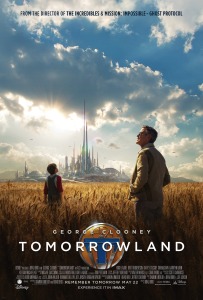 “Tomorrowland” is the first movie of the summer, and perhaps many summers, that doesn’t involve a sentient robot plotting to exterminate the Earth with a giant asteroid, or a massive Earthquake ravaging the San Andreas fault line, or the apocalypse transforming the world into a desert wasteland. Director Brad Bird has a squeaky clean vision of the future but also a sense of excitement earned from modest thrills of both the sci-fi and the lo-fi variety.
“Tomorrowland” is the first movie of the summer, and perhaps many summers, that doesn’t involve a sentient robot plotting to exterminate the Earth with a giant asteroid, or a massive Earthquake ravaging the San Andreas fault line, or the apocalypse transforming the world into a desert wasteland. Director Brad Bird has a squeaky clean vision of the future but also a sense of excitement earned from modest thrills of both the sci-fi and the lo-fi variety.
Seeing a family-friendly adventure film with a strong sense of humor and healthy head of ideas is certainly a refreshing, positive change of pace from the doom and gloom. Yet “Tomorrowland” would play almost perfectly if it didn’t also try to make the idea of a squeaky clean future over a bleak one its very thesis.
“Tomorrowland” is named for the futuristic area in Disney World and Disneyland, but Bird’s film is as much about an amusement park as “Pirates of the Caribbean” is about the animatronic pirate ride also housed in Orlando and Anaheim. And while it doesn’t serve as a blatant ad for Disney the way many of their most recent properties have, Bird trots out the names of Edison, Tesla, Einstein and Jules Verne, along with a healthy dose of inspirational idioms designed to lead the innovation of Disney’s next wave of “Imagineers”.
One of those quotable motivation phrases comes when two parents ask their toddler daughter why she wants to go to space, warning her, “What if nothing’s there?” “What if everything is there?” That little girl grows up to be Casey Newton (Britt Robertson), and yes, her name is Newton. She’s a whip-smart techie and hacker who tries to prevent NASA from tearing down a launch pad and consequently put her dad (Tim McGraw). When she gets caught, she’s arrested and finds a pin with a blue and orange “T” along with her belongings. When she touches it, she’s transported to a shimmering civilization complete with jetpacks, rockets, hovering trains and more. But before she can board a rocket to the stars she’s plunged back into the real world.
Casey will spend much of “Tomorrowland” actually trying to reach the place, and Bird and screenwriter Damon Lindeloff make an interesting choice in withholding our arrival there for so long. It’s a future that seems out of reach and is notably less glamorous when we finally arrive, but all along the way Casey encounters incredible science fiction set pieces, from robots to time freeze rays to a sickly matter transporter that suggest the genius and innovation that can be found here at home.
To get to Tomorrowland, Casey enlists the help of Frank Walker (George Clooney), a former resident who we first meet as a little boy. He submits his jetpack invention to a contest at the 1964 New York World Fair, and is recruited to be a Tomorrowland citizen by a young girl named Athena (Raffey Cassidy). Now Clooney plays the sourpuss to the two wide-eyed, freckly young women in his company, hilariously cynical at the idea of Tomorrowland and awaiting the arrival of the end of the world, which he believes will occur in less than 60 days. Only with Casey’s arrival does he get a glimmer of hope that the fate of the future and planet can be spared.
Bird gets a lot of mileage out of this premise, and he has fun with expectations as well. For as much fun as it is to see Clooney zap robots with makeshift laser booby traps, it’s just as refreshing to see Bird stop the sci-fi and watch Casey beat a robot to death with a baseball bat.
But Clooney says something that reflects “Tomorrowland”’s blind desire for positivity without much room for cynically challenging the idea of utopia: “Can’t you just be amazed and move on?” Tomorrowland as an actual, functioning place is never as fully developed as it would seem. Eventually it becomes clear that it’s a haven for geniuses in an alternate dimension where they can explore their ideas free of politics and intervention. Hugh Laurie, playing Tomorrowland’s head-honcho Nix, even stops the movie near its climax to deliver a monologue about humanity’s sloth and negativity, one that will bring about the end of the world.
It isn’t surprising that a Disney movie might choose to avoid some of the ramifications of a world for privileged geniuses in paradise, or that there was ever a person named Ayn Rand. Yet “Tomorrowland” doesn’t deserve that sort of hyper-analysis. It’s too much fun, and already it’s being written off as a stodgy example of Disney embedding branding into their films, despite being a massive financial failure for the Mouse House already. If Bird’s film teaches us anything, it’s that there’s hope for Hollywood blockbusters as much as there is for the human race.
3 stars